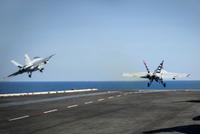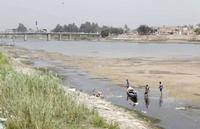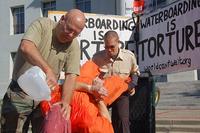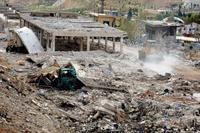-
Could the Sydney siege have been predicted and prevented?
It’s the question everyone is asking — could the Sydney siege have been predicted and therefore prevented based on the past behavior of gunman Man Haron Monis. Monis’s troubled history was well known to media and the police, but can we predict if and when such a person is likely to commit any further crimes? Further, we need to be very careful about stereotyping the mentally ill as potentially “dangerous.” It is simply not the case that all people with serious mental illnesses are prone to violence. There are very specific factors that govern the complex relationship between mental illness and violence. We need to understand and prevent people from experiencing them.
-
-
Who killed Dag Hammarskjold? Sweden calls for new inquiry into 1961 death of UN chief
One of the most intriguing, and unresolved, questions in contemporary African history – and in the history of the cold war – is: How and why did UN secretary general Dag Hammarskjold die on 18 September 1961? More often than not, people more directly ask: Who killed Hammarskjold? On 18 September 1961, Hammarskjold boarded a DC-6 airplane to fly to Ndola, a mining town in Zambia, which at the time was called Northern Rhodesia, for a meeting with Mois Tshombe, the leader of mineral-rich Congolese province of Katanga. A year earlier, Tshombe announced that Katanga was seceding from the newly independent Congo. Hammarskjold was flying to meet Tshombe in an effort to negotiate a peaceful resolution of the conflict between Congo and Katanga – but he never made it. The plane crashed in a heavily forested terrain a few miles from the Ndola airport. Different inquiries conducted in the following fifty years into the reasons for and circumstances of the crash were inconclusive. Last year a United Nations panel concluded that there was “persuasive evidence that the aircraft was subjected to some form of attack or threat as it circled to land at Ndola.” Last Monday, Sweden – Hammarskjold was a Swede — formally asked the UN General Assembly to reopen the investigation into his death.
-
-
U.S. air strikes kill three top ISIS leaders

U.S. officials said yesterday that a U.S.-led air strikes in Iraq have killed three of the top leaders of Islamic State (ISIS), but not the group’s senior commander Abu Bakr al-Baghdadi. Among those killed was Abd al Basit, who was described by officials as the group’s military “emir,” and Haji Mutazz, a deputy to Baghdadi. The strikes took place between 3 December and 9 December, the officials said.
-
-
Radicalization and the lone wolf: what we do and don’t know
Even with the growing body of empirical research contributing to understanding radicalization, cases such as that of Man Haron Monis raise questions about whether individual actors, known as “lone wolves,” are terrorists, violent extremists, radicals, or simply lone gun men. Contrary to popular belief, ideology and religion play a less important role in radicalization. Current research indicates that the emotional appeal to personal identity and group solidarity are far more significant factors in radicalization. What recent lone-wolf cases — Man Haron Monis in Sydney, Canadian Michael Zehaf-Bibeau, Anders Breivik in Norway, and Mohammed Merah in France — tell us is that, unlike the strategic model of terrorism as a rational choice to carry out acts of violence in the name of a cause, these modern-day lone-wolf terrorists may be more like lone gunmen than terrorists.
-
-
Public support for torture declines as people learn the explicit details of torture techniques
Does the American public condone torture when the goal is to prevent terrorist attacks? News headlines reporting the results of a Pew Research Center poll released on 9 December indicate more than half of Americans do. That finding, however, is not necessarily valid, says Tufts University’s Richard Eichenberg, who argues that the poll is flawed because it is based on a faulty premise. A more accurate picture of the nation’s attitude can be found in responses to polls conducted by Pew, Gallup, and other news organizations and analyzed in a 2010 report. These surveys explained in graphic detail what interrogation techniques were being judged. So while response to more general questions on the use of torture may continue to produce mixed reactions, Eichenberg says public support for torture will decline as more people become aware of the explicit details of torture techniques contained in the Senate report.
-
-
FBI moves cyberthreats to top of law-enforcement agenda
FBI director James Comey said combatting cybercrime and other cyber threats are now top FBI priority. “It (the Internet) is transforming human relationships in ways we’ve never seen in human history before,” Comey said. “I see a whole lot of hacktivists, I see a whole lot of international criminal gangs, very sophisticated thieves,” he added. “I see people hurting kids, tons of pedophiles, an explosion of child pornography.” In October Comey urged Congress to require tech companies to put “backdoors” in apps and operating systems. Such a move would allow law enforcement officials to better to monitor suspected criminals who often escape the law using encryption and anti-surveillance computer software.
-
-
Senate expects to extend terrorism insurance after House passes bill
After the House passed the Terrorism Risk Insurance Program Reauthorization Act of 2014 (TRIPRA) last week, supporters of the bill expect the Senate to approve it, although they are unsure when that will occur. The current version of the program is expected to expire by 31 December unless Congress renews the legislation or places a temporary extension.The House version would extend TRIPRA for six years, increase the threshold for government reimbursement from $100 million to $200 million, and increase companies’ co-payments to 20 percent from 15 percent.
-
-
Analyzing how emotions ripple following terrorist events
The 2013 Boston Marathon bombing motivated mass expressions of fear, solidarity, and sympathy toward Bostonians on social media networks around the world. In a recently released study, researchers analyzed emotional reactions on Twitter in the hours and weeks following the attack. The study is the first large-scale analysis of fear and social-support reactions from geographically distant communities following a terrorist attack. The full results of the study may provide insight to governmental agencies exploring how best to handle public fear following a disruptive event.
-
-
ISIS uses control of water as a tool of war

Global security analysts have warned for some time now that water scarcity due to climate change will be used as a tool of war in regions with poor governance.The on-going wars in Iraq and Syria provide the first examples of the strategic and tactical use of water as a tool of war, as militant groups operating in both countries have been using water against residents of areas they control. “ISIS has established a blueprint that can be used by other entities to take advantage of drought and water scarcity,” writes one researcher. “For all the conversation about ISIS taking control of oil refineries, one could argue that their control of water is even more significant, as it deprives the population of a resource necessary for daily sustenance and gives the militant group significant leverage over local governments and populations.”
-
-
Michigan teen-ager faces terrorism charges after posting anonymous threats
A 17-year-old Brandon High School student in Oakland County, Michigan has been arrested and accused of posting online threats using the anonymous app, After School. The Oakland County Sheriff’s office contacted the app provider and served subpoenas to identify the anonymous user who posted seventeen messages and five pictures, ranging from “Tomorrow I am going to shoot and kill every last one of you and it’s going to be bigger than Columbine,” “Death to you all,” and “Bang Bang Brandon Bang Bang,” to stock photos of a person holding a pump-action shotgun.As of Thursday evening, Apple has pulled the After School app from its App Store.
-
-
More than 5,000 killed in Jihadist violence in November
Jihadist groups killed more than 5,000 people in November, with Iraq topping the death league table, followed by Nigeria, Afghanistan, and Syria. In 664 incidents recorded in November by the BBC World Service and researched jointly with the International Center for the Study of Radicalization and Political Violence at King’s College London, the overall death toll was 5,042, or an average of 168 deaths per day. After Iraq, Nigeria, Afghanistan, and Syria, Yemen was fifth in the number of deaths, tying with Somalia, with 37 incidents each.
-
-
Report details brutal interrogation practices, lax supervision

The long-awaited report on the CIA interrogation practices was release yesterday, causing a political storm. Many congressional Republicans have expressed concern over the release of the Senate report on the CIA’s use of torture on captured al-Qaeda and Islamist militants, claiming it would set off a global backlash, and threaten the security of American troops and diplomatic missions overseas.Obama administration officials agree that the release of the Senate report or its declassified executive summary is a good reason for concern about the security of U.S. facilities and military bases overseas, but they doubt it would lead to the sort of violence that killed four Americans at a diplomatic outpost in Benghazi, Libya in 2012.
-
-
Israel attacks targets in Syria to prevent advanced arms shipments to Hezbollah

Israeli jets bombed two military targets in Syria – one near the Damascus International Airport, the other near the town of Dima, north of Damascus and near the Syria-Lebanon border – and as has been the case in previous such attacks, there was no confirmation or elaboration from Jerusalem. Syrian general command sources said that several facilities had been hit, both at the Damascus International Airport and in the area of Dimas. This is the tenth Israeli attack against military depots in Syria since January 2013. The attacks have had a specific goal: to prevent the Assad regime and Iran from transferring advanced weapon systems to Hezbollah. When Israel’s intelligence services notice that such systems are gathered for the purpose of shipping them to Hezbollah, the shipments are destroyed before they are delivered to Hezbollah.
-
-
U.S. concerns grow as ISIS establishes a base of operations in Libya
Last week the Pentagon publicly expressed its concerns about the fact the ISIS has established a base of operation in Libya. The commander of the U.S. army’s Africa Command told reporters that ISIL (ISIS) is now running training camps in the town of Derna, 450 miles east of Tripoli, where as many as 200 local fighters are receiving instruction. “ISIL has begun its efforts over in the east out there,” said General David Rodriguez. “It’s mainly about people coming for training and logistics support right now.”
-
-
Britain searches for ways to fight radicalization among Muslim youths
More than 500 Britons have traveled to Syria and Iraq to fight for extremist groups, including the Islamic State (ISIS), and roughly half of them have returned home, according to British intelligence officials. Law enforcement authorities are now concerned that those individuals may carry out attacks on British soil. From 2008 to 2009, the British government spent more than $200 million as part of its “Prevent” program to influence Muslim youths, but critics say it has not worked.
-
More headlines
The long view
What Does Netflix’s Drama “Adolescence” Tell Us About Incels and the Manosphere?
While Netflix’s psychological crime drama ‘Adolescence’ is a work of fiction, its themes offer insight into the very real and troubling rise of the incel and manosphere culture online.
